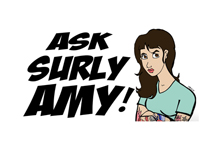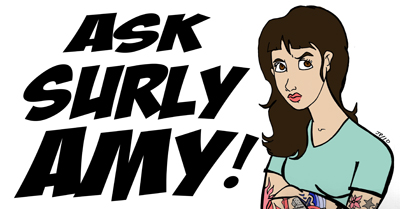Ask Surly Amy (and Bug Girl) : Science Outreach

Dear Surly Amy,
It’s my dream to work in a science museum or some organization which focuses on science outreach and informal science education. I have a BS in Physics and a Graduate Diploma in Science Communication. I have been looking at job postings, and it seems that most of the jobs I want require/prefer a PhD/Master’s and/or teaching credentials/teaching experience.
My question is, do I have to have a PhD to be taken seriously as a science communicator? I am not interested in 4+ more years of school, or in doing research. I am also not interested in teaching in a classroom environment. Would it be worth it to take two to six years to do something I won’t enjoy just to be a more competitive applicant? And, am I betraying my gender by not getting more education? Women in scientific research, physics especially, are so few that I feel a little obligated to be the best that I can be.
Thanks,
Linda
This question falls a bit out of my field of expertise so I called in the big guns. The big guns being our resident scientist, the mighty Bug Girl to get her take on the situation.
And I’m glad I did because my first instinct was to say, yes get all the schooling you can but now I’m realizing this might not be the best avenue to get you the particular job you want.
Here is what Bug had to say in an email:
I think the worst thing she could do would be to get a PhD; she’s got plenty of degrees already. It would probably make her job search harder, not easier. What she needs now is experience!
Unfortunately, the museum and nature center set is a fairly closed group. Volunteering and working at a low level is the way to go to get her foot in the door. People hire who they know, or who their friends know.
She should join the Association of Science and Technology Centers (ASTC) and start networking: http://www.astc.org/
The Association of Nature Center Administrators is also a good spot, but less physics-oriented: http://www.natctr.org/Having a teaching certificate would be helpful; that is often desired by many science and nature centers, because they want to align their programs with science degree requirements. Because of budget cuts, a lot of science is now outsourced to science and nature centers. But she’ll still need experience. Since most teaching cert programs are meant for folks working full time, they are online or evening–so working on both is quite possible.
There is only one museum in the US that I know of that is hiring PhDs for public outreach, and that is an experimental model for science communication in North Carolina: http://naturesearch.org/.
It’s an exciting idea, but only 4 scientists are going to be hired.It is also a pretty crappy time to be going into the non-profit science center industry, since state/local budgets are cutting just these sorts of programs. Looking for corporate outreach jobs might be more successful.
Bug even went so far as to write out a full post on the question of whether or not to pursue a PhD. The post is called The PhD Question. Please go read it. It gives a far clearer explanation on this topic than I ever could.
Good luck in your pursuits and I hope you find your dream job!
Got a question you would like some Surly-Skepchick advice on? Send it in! We won’t publish your real name, unless you want us to and creative pseudonyms get bonus points! Just use the contact link on the top left of the page.






Thanks for the advice Amy and Bug Girl! That makes me feel a lot better about my career situation right now. I’ll definitely do volunteering and/or lower level jobs.
-Linda
I know a couple of people who work at or volunteer at local science museums. I don’t think they get paid very much, if anything, but it is a way to get your foot in the door. I know some of them read this blog, at least occasionally, and was hoping one of them would respond, but apparently not.
.
I don’t know what qualifications you would need, but I suspect enthusiasm and an inquiring mind are the most important. I think for formal education, a bachelors in a relevant field would be sufficient, though I don’t think a masters or work towards one would hurt. But I’m pretty sure a PhD is completely unnecessary. Education skills would help a lot. I don’t think teacher certification is necessary, but I think it would help. I’m just guessing here; I hope you can get more knowledgeable advice.
.
You might consider doing the education training bit part time, while volunteering or working at a low-level museum job. Due to the (presumed) low pay, you would have to be prepared to live a hand-to-mouth, student-like existence for at least several more years.
.
The question about betraying your gender by not getting more education, which to me implies you think you might be wasting your education so far, is just like the question addresses in today’s quickie about women doctors. There were a bunch of good comments at the blog post linked in the quickies. They were talking about medicine, but I think the discussion is applicable to any field involving limited numbers of people and advanced, highly technical education. But the bottom line is it’s your life, and you should do what you want with it, not be guilt-tripped into what someone else wants.
.
Science always needs more public outreach; good luck with it. Go get ’em!
This sounds exactly like the situation I’m finding myself in, except my degrees are a BS in Marine Biology and MS in Biodiversity and Conservation Biology. Great advice! And good luck, Linda
You might also consider trying to find a job with a news media or a political organization as a science writer. There doesn’t seem to be too many jobs there, but the content seems to be at the BS level.